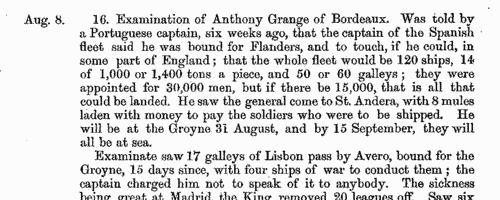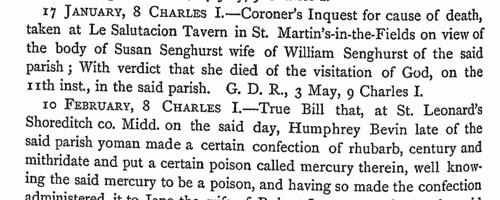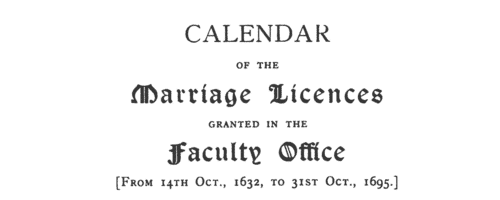Bacchus Surname Ancestry ResultsOur indexes 1000-1999 include entries for the spelling 'bacchus'. In the period you have requested, we have the following 115 records (displaying 1 to 10): Single Surname Subscription | | | Buying all 115 results of this search individually would cost £618.00. But you can have free access to all 115 records for a year, to view, to save and print, for £100. Save £518.00. More... |
These sample scans are from the original record. You will get scans of the full pages or articles where the surname you searched for has been found. Your web browser may prevent the sample windows from opening; in this case please change your browser settings to allow pop-up windows from this site. Tenants, founders and incumbents of Yorkshire chantries
(1546-1548)
Chantries were established to perform services for the souls of their founders and other faithful dead, including annual obits and anniversaries at which alms were usually distributed. The chantries could be at an existing altar in a parish church, a new altar in a side chapel of an existing church, in a new chapel in the churchyard or some miles from an existing church: few were founded before 1300, and most date from 1450 to 1500. Hospitals were places provided by similar foundations to receive the poor and weak; there were also religious guilds, brotherhoods and fraternities, and colleges (like large chantries at which three or more secular priests lived in common). An Act of Parliament of 1545 gave king Henry VIII the power to dissolve such chantries, chapels, &c., the proceeds to be devoted to the expenses of the wars in France and Scotland. Commissioners were appointed 14 February 1546 to survey the chantries and seize their property, and from 1546 to 1548 the commissioners produced these certificates giving brief details of the establishment and nature of each foundation, with an inventory of valuables and rental of lands. The individuals named in the certificates are thus the founder, the present incumbent, and the tenants whose rents provided the chantry's income. All the surviving certificates were edited by William Page for the Surtees Society, and published from 1892.BACCHUS. Cost: £6.00.  | Sample scan, click to enlarge

| Official Papers
(1598-1601)
The State Papers Domestic cover all manner of business relating to Britain, Ireland and the colonies, conducted in the office of the Secretary of State as well as other miscellaneous records.
BACCHUS. Cost: £4.00.  | Sample scan, click to enlarge

| Wills proved at York: Names of Testators
(1627-1637)
The diocese of York comprised most of Yorkshire, and Nottinghamshire: the York Exchequer court was the ordinary probate jurisdiction for the Yorkshire part of the diocese, but some wills from Nottinghamshire and other parts of the province of York were also proved there. Dr Francis Collins compiled this index to the transcribed wills of the Prerogative and Exchequer Courts in the York registry proved from 1627 to 1637. The date on the left is that of probate; the testator's full name is then given (surname first), parish or place of abode, and sometimes occupation, and date that the will was executed; and volume and folio number where it the transcript commences. The Act Books were used by Dr Collins to supply deficiencies in the information from the transcripts.BACCHUS. Cost: £2.00.  | Sample scan, click to enlarge

| York Will Calendar
(1660-1665)
The diocese of York comprised most of Yorkshire, and Nottinghamshire: the York Exchequer court was the ordinary probate jurisdiction for the Yorkshire part of the diocese, but some wills from Nottinghamshire and other parts of the province of York were also proved there. Dr Francis Collins compiled this index to the wills in the York registry proved from 1660 to 1665. The date of the probate precedes the name of the testator: during the period covered by the volume the dates of probate are very rarely given in the registers - they were therefore supplied from the Act Books. However, the Act Book for Ainsty, City and Craven deaneries is missing for this period, and in those cases no date could be given. In a very few instances (marked with an asterisk) in these deaneries in which the date has been supplied it has been taken from the registers. Additional matter from the Act Books is given within square brackets. Testators' names are given in full, surname first; then parish or place of abode, and in some cases occupation; then date of the will itself; and volume and folio number in the probate register. Where a place of burial, or intended burial, was indicated, that is also added, with the word 'bur.', within round brackets. All wills between 1652 and 1660 were proved in London; in practice, many Yorkshire wills had remained unproved at the date that the York Exchequer probate court was restored, and so there is in this list a large number of wills dating back through the 1650s.BACCHUS. Cost: £2.00.  | Sample scan, click to enlarge

| Middlesex Sessions
(1625-1666)
Incidents from the Middlesex Sessions Books. These are abstracts of sessional orders, minutes of criminal cases, memoranda and other entries of record taken from the volumes of Gaol Delivery Register, Books and Rolls, Sessions of Peace Register, and Process Books of Indictments for the county of Middlesex from the death of king James I to the Great Fire of London. The references at the end of each item indicate the volume in question, the abbreviations being G. D. for Gaol Delivery, S. P. for Sessions of Peace, and S. O. T. for Session of Oyer and Terminer; occasionally preceded by S. for Special or G. for general, or followed by R. for Roll or Reg. for Register. It should be noted that, in the case of 'true bills' or indictments, the abstract starts with the date on which the offence took place, the date of the conviction &c. being at the end of the entry. These abstracts, prepared by John Cordy Jeaffreson for the Middlesex County Record Society, are far from being a complete calendar of these extensive records; his purpose was, in part, to notice 'every parchment that should exhibit a famous person's name or any other feature of personal interest'.BACCHUS. Cost: £4.00.  | Sample scan, click to enlarge

| Allegations for marriages in southern England
(1660-1679)
The province or archbishopric of Canterbury covered all England and Wales except for the northern counties in the four dioceses of the archbishopric of York (York, Durham, Chester and Carlisle). Marriage licences were generally issued by the local dioceses, but above them was the jurisdiction of the archbishop, exercised through his vicar-general. Where the prospective bride and groom were from different dioceses it would be expected that they obtain a licence from the archbishop; in practice, the archbishop residing at Lambeth, and the actual offices of the province being in London, which was itself split into myriad ecclesiastical jurisdictions, and spilled into adjoining dioceses, this facility was particularly resorted to by couples from London and the home counties, although there are quite a few entries referring to parties from further afield. The abstracts of the allegations given here usually state name, address (street in London, or parish), age, and condition of bride and groom; and sometimes the name, address and occupation of the friend or relative filing the allegation. Where parental consent was necessary, a mother's or father's name may be given. The ages shown should be treated with caution; ages above 21 tended to be reduced, doubtless for cosmetic reasons; ages under 21 tended to be increased, particularly to avoid requiring parental consent; a simple statement 'aged 21' may merely mean 'of full age' and indicate any age from 21 upwards. These are merely allegations to obtain licences; although nearly all will have resulted in the issuing of the licence, many licences did not then result in marriage. This index also includes marriage licence allegations for the jurisdiction of the Dean and Chapter of Westminster, 1558 to 1699.BACCHUS. Cost: £4.00.  | Sample scan, click to enlarge

|  Masters and Apprentices
(1713) Masters and Apprentices
(1713)
Apprenticeship indentures and clerks' articles were subject to a 6d or 12d per pound stamp duty: the registers of the payments usually give the master's trade, address, and occupation, and the apprentice's father's name and address, as well as details of the date and length of the apprenticeship. 1 January to 31 December 1713.BACCHUS. Cost: £8.00.  | Sample scan, click to enlarge

| Licences for marriages in southern England
(1632-1714)
The province or archbishopric of Canterbury covered all England and Wales except for the northern counties in the four dioceses of the archbishopric of York (York, Durham, Chester and Carlisle). Marriage licences were generally issued by the local dioceses, but above them was the jurisdiction of the archbishop. Where the prospective bride and groom were from different dioceses it would be expected that they obtain a licence from the archbishop; in practice, the archbishop residing at Lambeth, and the actual offices of the province being in London, which was itself split into myriad ecclesiastical jurisdictions, and spilled into adjoining dioceses, this facility was particularly resorted to by couples from London and the home counties, although there are quite a few entries referring to parties from further afield. Three calendars of licences issued by the Faculty Office of the archbishop were edited by George A Cokayne (Clarenceux King of Arms) and Edward Alexander Fry and printed as part of the Index Library by the British Record Society Ltd in 1905. The first calendar is from 14 October 1632 to 31 October 1695 (pp. 1 to 132); the second calendar (awkwardly called Calendar No. 1) runs from November 1695 to December 1706 (132-225); the third (Calendar No. 2) from January 1707 to December 1721, but was transcribed only to the death of queen Anne, 1 August 1714. The calendars give only the dates and the full names of both parties. Where the corresponding marriage allegations had been printed in abstract by colonel Joseph Lemuel Chester in volume xxiv of the Harleian Society (1886), an asterisk is put by the entry in this publication. The licences indicated an intention to marry, but not all licences resulted in a wedding. BACCHUS. Cost: £4.00.  | Sample scan, click to enlarge

|  Masters and Apprentices
(1717) Masters and Apprentices
(1717)
Apprenticeship indentures and clerks' articles were subject to a 6d or 12d per pound stamp duty: the registers of the payments usually give the master's trade, address, and occupation, and the apprentice's father's name and address, as well as details of the date and length of the apprenticeship. 1 January to 8 November 1717.BACCHUS. Cost: £8.00.  | Sample scan, click to enlarge

|  Apprentices registered in Staffordshire
(1741-1745) Apprentices registered in Staffordshire
(1741-1745)
Apprenticeship indentures and clerks' articles were subject to a 6d or 12d per pound stamp duty: the registers of the payments usually give the master's trade, address, and occupation, and the apprentice's father's name and address, as well as details of the date and length of the apprenticeship. There are central registers for collections of the stamp duty in London, as well as returns from collectors in the provinces. These collectors generally received duty just from their own county, but sometimes from further afield. (The sample entry shown on this scan is taken from a Norfolk return)BACCHUS. Cost: £8.00.  | Sample scan, click to enlarge

|
Research your ancestry, family history, genealogy and one-name study by direct access to original records and archives indexed by surname.
|













